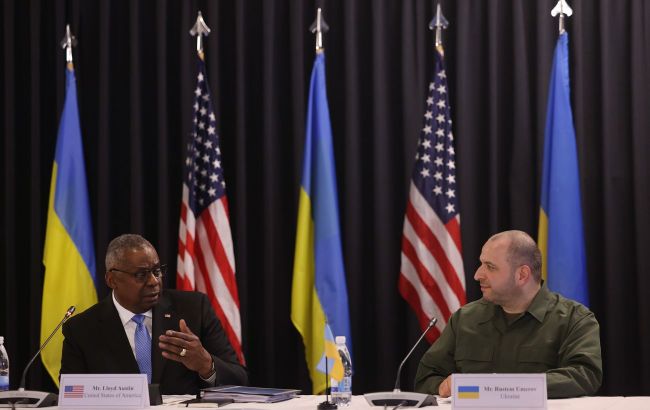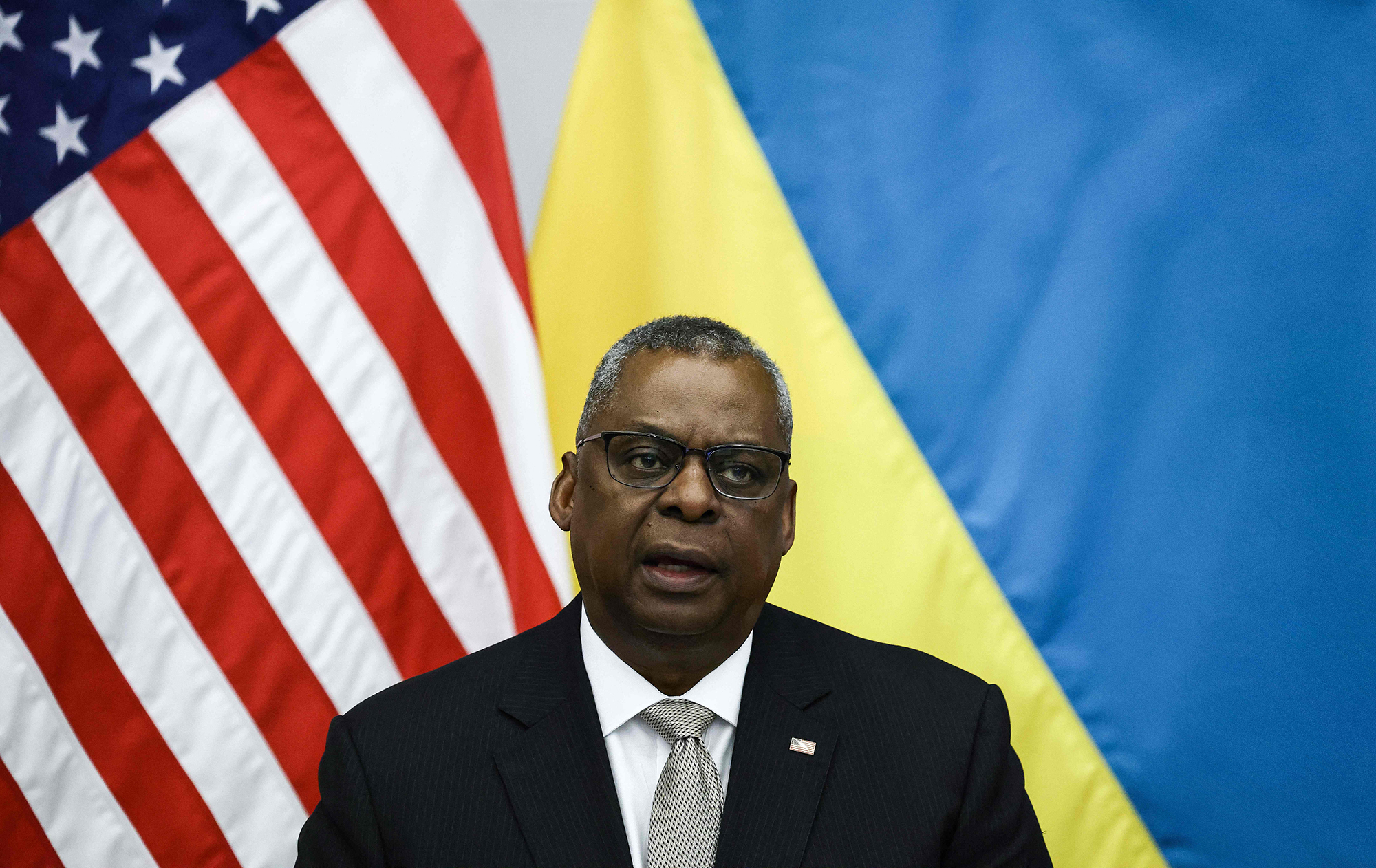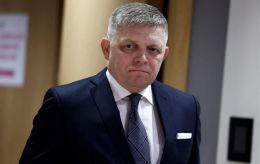Anniversary Ramstein: What should Ukraine expect from 20th meeting of allies
 Photo: Ramstein-20 meeting will be held in a face-to-face format (Getty Images)
Photo: Ramstein-20 meeting will be held in a face-to-face format (Getty Images)
A new meeting in the Ramstein format will take place today, March 19. The Contact Group on Military Assistance to Ukraine will meet in Germany. This is the 20th meeting of the allies, and it will be chaired by Pentagon chief Lloyd Austin. RBC-Ukraine has collected everything known about Ramstein 20 in the article.
Sources used: Ministry of Defense of Ukraine and the US Department of Defense portal, Lloyd Austin's statement on social network X, Spiegel, Wprost, Shephard Media.
Contents:
- Ramstein 20. Offline meeting in Germany
- Agenda
- Expectations from meeting
- New coalitions and emergency aid from US. Allies' statements on Ramstein eve
- Ramstein meetings importance
Ramstein 20. Offline meeting in Germany
The US Department of Defense has announced the next meeting of the Ukraine Defense Support Contact Group (UDSCG) for Tuesday, March 19.
The venue for the 20th anniversary meeting was announced as the German air base Ramstein AB, where the allies gathered for the first time in the spring of 2022 and where the informal name of the format originated.
The meeting will be chaired by Pentagon chief Lloyd Austin. He left for Germany on Monday. This will be his first international trip since his hospitalization. The last meeting in February was held online due to the US Secretary of Defense's health problems.
General Charles Quinton Brown Jr., Chairman of the Joint Chiefs of Staff, will attend the Ramstein meeting along with Austin. In total, Defense Ministers and senior military officials from about 50 countries have been invited to the meeting.
 Photo: Lloyd Austin will chair the Ramstein 20 meeting (Getty Images)
Photo: Lloyd Austin will chair the Ramstein 20 meeting (Getty Images)
Agenda
The main topic of each meeting is the provision of military assistance to Ukraine in countering large-scale Russian aggression and synchronization of the allies' response.
The Pentagon has officially announced that the Contact Group will meet again on March 19 to discuss the war in Ukraine and to reaffirm that the United States and the coalition continue to support the people of Ukraine in their defense against the Russian occupiers.
Pentagon spokesperson Sabrina Singh said that the United States would not allow Ukraine to fail in its war.
As Lloyd Austin stated on the eve of Ramstein 20, the coalition would focus on Ukraine's immediate needs on the battlefield and long-term security.
Expectations from meeting
In preparation for the Ramstein 20 meeting, Ukraine's Defense Minister Rustem Umerov and the Commander-in-Chief of the Armed Forces of Ukraine Oleksandr Syrskyi held telephone conversations with US Secretary of Defense Lloyd Austin.
The defense officials discussed Ukraine's medium- and short-term needs and specific requests. In particular, Rustem Umerov named ammunition and air defense as key priorities for allied assistance.
 Photo: Syrskyi and Umerov discuss Ukraine's needs with Austin (facebook.com/rustemumerov.ua)
Photo: Syrskyi and Umerov discuss Ukraine's needs with Austin (facebook.com/rustemumerov.ua)
Expectations from Ramstein and the purpose of the next meeting were also discussed in a conversation between US Defense Secretary Lloyd Austin and NATO Secretary General Jens Stoltenberg. According to the Pentagon press service, the two leaders emphasized the importance of strengthening the transatlantic defense industrial base to continue supporting Ukraine.
New coalitions and emergency aid from US. Allies' statements on Ramstein eve
On March 15, German Chancellor Olaf Scholz met with French President Emmanuel Macron and Polish Prime Minister Donald Tusk and announced the creation of a new coalition of long-range rocket artillery for the Ukrainian army.
According to Scholz, the coalition will be formed within the framework of the Ramstein contact group. He also announced that an agreement had been reached with Macron and Tusk to expand the production of military equipment in cooperation with other partners of Ukraine.
Later, German Defense Minister Boris Pistorius confirmed the agreement with Poland to increase the production of ammunition for Ukraine.
According to him, supporting the Ukrainian army in the war against Russia is not just about supplying ammunition that "can be found somewhere." The Minister emphasized the need to increase production in Germany, Poland, and other countries.
Another coalition in support of Ukraine was announced by Polish Defense Minister Wladyslaw Kosiniak-Kamysh. He noted that Poland and Germany are seeking to assume responsibility for rapid response forces in Europe by creating an armored coalition.
Kosiniak-Kamysh said that starting in July, their battlegroups, 2,500 Polish soldiers and 2,500 German soldiers, will be in a state of readiness for rapid response. These are the forces that fulfill the tasks of the strategic compass.
The news comes on the heels of recent statements by French President Emmanuel Macron about the possibility of sending NATO troops to Ukraine. In particular, he suggested that French troops could be deployed to Ukraine in the event of a repeated Russian offensive on Kyiv or Odesa.
At the same time, several NATO countries opposed this idea (Germany, Czechia, Bulgaria, Poland, Spain, and Italy). However, Lithuania, Latvia, and Estonia have expressed their readiness to consider such a possibility.
On the eve of Ramstein, Belgium announced a €412 million military aid package for Ukraine. It will include 300 LMV armored vehicles. In addition to the multi-purpose armored vehicles, it is planned to transfer mine trawls.
Belgium will provide basic training, and the Netherlands will provide on-the-job training for Ukrainian crews of minesweeping vessels. Belgium has also promised to provide Ukraine with military assistance totaling €611 million through 2024. About half of this amount was allocated for additional artillery ammunition.
Meanwhile, in the United States, the issue of financing military aid to Ukraine worth more than $60 billion remains open due to disputes in Congress.
Last week, the White House announced an emergency package worth $300 million, which will include artillery shells and GMLRS missiles for HIMARS.
However, the Pentagon believes that this package is insufficient, although it meets the immediate needs of the Armed Forces. The department noted that its provision was a unique case without the possibility of repetition.
Pentagon spokesperson Air Force Major General Pat Ryder said that the only way to meet Ukraine's needs on the battlefield is for Congress to quickly pass an additional document.
Earlier, Western media reported that the US House of Representatives may vote for a financial assistance package for Ukraine in late March or April 2024.
Ramstein meetings importance
Meetings of the Ukraine Defense Contact Group have been held since April 2022 at the initiative of Pentagon Chief Lloyd Austin.
Their purpose is to synchronize and accelerate the provision of military assistance to the Ukrainian Defense Forces in a full-scale war with Russia.
The results of the meetings allowed us to strengthen the capabilities of the Ukrainian Armed Forces to repel the enemy and begin Ukraine's transition to NATO weapons.
The Ukrainian Defense Forces received long-range multiple-launch rocket systems M270, HIMARS, MARS II, Brimstone, Harpoon, and ATACMS missiles.
Ukrainian air defense was reinforced with NASAMS, Avenger, HAWK, IRIS-T, SAMP-T, and Patriot air defense systems.
A tank coalition was created, which resulted in the delivery of Leopard and Abrams tanks.
Another coalition is working on sending F-16 fighter jets to Ukraine. The pilots are currently undergoing training, and the first planes may appear in the sky by the summer of 2024.
The Ramstein also launched coalitions for drones, demining, and integrated air and missile defense.
The last meeting of the Contact Group on Ukraine's Defense in the Ramstein format took place on February 19. It was the first meeting with the participation of the new Commander-in-Chief of the Armed Forces of Ukraine, Oleksandr Syrskyi.
All the results of the meeting can be found in the RBC-Ukraine article.

